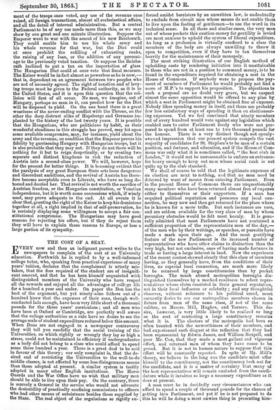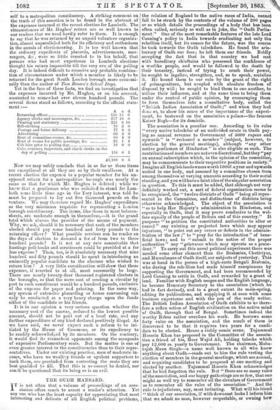THE COST OF A SEAT.
EVERY now and then an indignant parent writes to the newspapers to complain of the coat of an University education. Forthwith he is replied to by a well-informed college tutor, who, speaking from practical experience of many years' tuition, declares that the complainant is utterly mis- taken, that the fees required of the student are of insignifi- cant amount, and that he has been himself acquainted with distinguished members of the University who have reaped all the rewards and enjoyed all the advantages of college life for a hundred a year and under. On paper the Don has the best of the argument, but yet ninety-nine fathers. out of a hundred know that the expenses of their sons, though well- conducted lads enough, have been very little short of a thousand pounds for the three years' curriculum ; and all men who have been at Oxford or Cambridge, are perfectly well aware that the college authorities as a rule have no desire to see the average scale of student expenditure reduced below this amount. When Dons are not engaged in a newspaper controversy they will tell you candidly that the social training of the Universities, on which rightly or wrongly they lay so high a stress, could not be maintained in efficiency if undergraduates as a body did not belong to a class who could afford to spend some three hundred a year. There is a great deal to be said in favour of this theory; our only complaint is, that the de- sired end of restricting the Universities to the well-to-do middle classes, is not effected by some less disingenuous means than those adopted at present. A similar system is tacitly adopted in many other English institutions. The Horse Guards and the War Office have no wish that military men should be able to live upon their pay. On the contrary, there is scarcely a General in the service who would not advocate the desirability of practically confining commissions to officers who had other means of subsistence besides those supplied by the State. The real object of the regulations so rigidly en-
forced amidst barristers by an unwritten law, is undoubtedly to exclude from circuit men whose means do not enable them to live upon the footing of gentlemen—to use the word in its technical sense. In all these and similar cases, the very =en out of whose pockets this caution-money for gentility is levied are most anxious to uphold the system of liberal expenditure. As long as a profession is virtually confined to a class the members of the body are always unwilling to throw it open to competition, even if they have to tax themselves heavily for the maintenance of their monopoly.
The most striking illustration of our English method of upholding caste by rendering initiation into it unattainable to those who are not in a position to command money, is to be found in the expenditure required for obtaining a seat in the House of Commons. If anybody were to propose the pay- ment of members of Parliament he would probably not find a score of M.P.'s to support his proposition. The objections to such a proposal are no doubt very grave, but we suspect almost the same opposition would be offered to any plan by which a seat in Parliament might be obtained free of expense. Nobody likes spending money in itself, and there are probably few less satisfactory ways of spending it than on electioneer- ing expenses. Yet we feel convinced that ninety members out of every hundred would vote against any legislation which enabled men to enter Parliament freely who were not pre- pared to spend from at least one to two thousand pounds for the honour. There is a very distinct though not openly- avowed impression that our present system compels the vast majority of candidates for St. Stephen's to be men of a certain position, and fortune, and education, and if the House of Com- mons was only what it is sometimes called, " the best club in London," it would not be unreasonable to enforce an entrance- fee heavy enough to keep out men whose social rank is not quite up to the club standard. We shall of course be told that the legitimate expenses of an election are next to nothing, and that no man need be deterred by want of means from entering Parliament. Even in the present House of Commons there are unquestionably many members who have been returned almost free of expense either to themselves or their supporters. If a man has acquired political reputation and possesses any local con- nection, he may now and then get returned for the place where he is known for a mere trifle. But such instances are rare, and are seldom available for the very class of men by whom pecuniary obstacles would be felt most keenly. It is gene- rally admitted that most Parliaments have not contained a sufficient proportion of the representative men of the day,— of the men who by their writings, or speeches, or pursuits have made a mark upon their age. And the most gratifying feature of the new Parliament is its increased number of
representatives who have other claims to distinction than the very high, but not exclusive, ones of having made fortunes in trade or having a large interest in land. Now the experience of the recent contest showed clearly that this class of members having, as they generally have, from the conditions of their lives, no especial local connection, are much more likely to be returned by large constituencies than by pocket. boroughs. The much abused metropolitan boroughs dis- tinguished themselves by a marked readiness to select repre- sentatives whose claim consisted in their general reputation, not in their local influence or celebrity ; and any thoughtful observer, without reference to his political creed, must earnestly desire to see our metropolitan members chosen in future from men of the same class, if not of the same calibre, as Messrs. Mill, Hughes, and Torrens. This de- sire, however, is very little likely to be realized so long as the cost of contesting a large constituency remains what it is. The electors of the metropolis had been so
often taunted with the unworthiness of their members, and had experienced such disgust at the reflection that they had been represented by Edwin James, and William Ronpell, and poor Mr. Cox, that they made a most gallant and vigorous effort, and returned men of whom they have cause to be
proud. But it is not in human nature to suppose that this
effort will be constantly repeated. In spite of M. Mill's theory, we believe is the long run the candidate mIst offer himself to the constituency, not the constituency look out for the candidate, and it is a matter of certainty that many of the best representatives will remain excluded from the candi- dature while it involves so large a necessary expenditure as it does at present. A man must be in decidedly easy circumstances who can afford to spend a couple of thousand pounds for the chance of getting into Parliament, and yet if he is not prepared to do this he will be doing a most unwise thing in presenting him-
self to a metropolitan constituency. A striking comment on the truth of this assertion is to be found in the abstract of the expenses incurred at the recent election for Lambeth. The circumstances of Mr. Hughes' return are so well known to our renders that we need hardly refer to them. It is enough to say that he was returned by an unpaid volunteer organiza- tion, almost unparalleled both for its efficiency and enthusiasm in the annals of electioneering. It is too well known that the ordinary expedients of placards, advertisements, mes- sengers, &c , were so little resorted to in his behalf, that persons who had most experience in Lambeth elections thought his return impossible till the very eve of the polling day. It is indeed difficult to conceive any probable combina- tion of circumstances under which a member is likely to be returned for the great South London borough more economi- cally than the author of Tom Brown's School Days.
Yet in the face of these facts, we find on investigation that the expenses incurred by Mr. Hughes, or on his account, amounted to somewhat over eleven hundred pounds. The several items stand as follows, according to the official state- ment :—
£ s. 6.
Returning officer 138 15 6 Agency clerks and messengers, &e. 217 16 0 Printing and stationery 251 0 10 Bill-sticking 78 3 0 Postage and letter delivery 77 8 3.
Advertising 63 2 6 Rent of committee-rooms, &c. 80 4 9 Rent of rooms for public meetings, &c. 28 1 4 Cab hire prior to polling day 18 0 0 Cabs, couriers, inspectors, and check clerks on the day of polling 155 8 1
£1,108 0 5
Now we may safely conclude that in as far as these items are exceptional at all they are so by their smallness. At a recent election the expense to a popular member for his un- opposed return for a metropolitan bol ough was nearly the same as that fur which Mr. Hughes is debited ; while we know that a gentleman who was solicited to stand for Lam- beth some little time ago in the Tory interest, was told he must be prepared to lay out five thousand pounds on the venture. We may therefore regard Mr. Hughes' expenditure as the very minimum requisite for representing a London borough constituency. The items, like those in most balance- sheets, are moderate enough in themselves,—it is the grand total which alarms the provider of the means of payment. Why, we ask, should it be necessary that each of the members elected should pay some hundred and forty pounds to the returning officer ? What possible services can be render on the days of election to demand a fee of from two to three hundred pounds ? Is it not at any rate conceivable that hustings poll-books and scrutineers could be provided at a far less expense ? Then, too, is it absolutely necessary that nine hundred and fifty pounds should be spent in introducing an eminently popular candidate to the electors who wished to return him ? A very little consideration will show that these expenses, if resorted to at all, must necessarily be large. There are nearly twenty-four thousand registered electors in the boroughs, so that the mere cost of sending a circular by post to each constituent would be a hundred pounds, exclusive of the expense for paper and printing. In the same way, any system of extensive placarding or house canvassing can only be conducted at a very heavy charge upon the funds either of the candidate or his friends.
It is in our opinion a very serious question whether the necessary cost of the canvas, reduced to the lowest possible amount, should not be paid out of a local rate, and any further expenditure of any kind declared positively illegal. As we have said, we never expect such a reform to be ini- tiated by the House of Commons, or its expediency to be readily acknowledged by its members. On the contrary, it would find its staunchest opponents among the occupants of expenkive Parliamentary seats. But the matter is one of even greater interest to the constituencies than to their repre- sentatives. Under our existing practice, men of moderate in- come, who have no wealthy friends or opulent supporters to back them, are precluded from contesting the seats they are beat qualified to fill. That this is so cannot be denied, nor can it be questioned that its being so is an evil.































 Previous page
Previous page